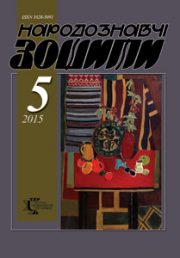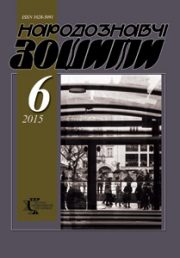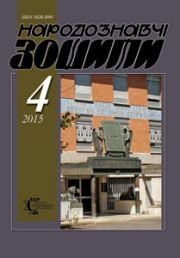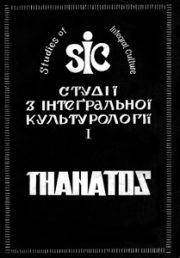The Ethnology Notebooks. 2018, 6 (144), 1610–1617
UDK 78.071.2:780.616.433(477.8)”19″(092)
DOI https://doi.org/10.15407/nz2018.06.1610
Received 21.11.2018
OLA OKUNIEWSKA: CREATIVE FATE OF JOHANNES ITTEN’S STUDENT
ORCID ID: https://orcid.org/0000-0003-1509-5367
Yatsiv Roman Myronovych, Vice-rector on the scientific work,
The Lviv National Academy of Arts,
Ph.D., professor, Honored Worker of Culture of Ukraine,
38 Kubiiovycha Str., 79011, Lviv, Ukraine.
Contacts: e-mail: jaciv@ukr.net
Abstract. The article deals with life and work of the mostly unknown among art historians Ukrainian-born artist Ola Okuniewska (1902—1985). Being a daughter of the Austro-Hungarian Empire Navy Medical Service Admiral Yaroslav Okuniewsky, she lived almost all her life outside her native Huzul region, which she visited only several times in her youth. She started her individual creative career in Vienna, where she was attending private studios of the famous artist and educator Johannes Itten, one of the reformers of art education. Since the end of 1919, O. Okuniewska became a freshman at Bauhaus — thestate highest new model art school. The reformist pedagogical principles of Itten seemed interesting to the Ukrainian girl, and she managed to produce interesting personal features in painting, graphics and compositions for a long creative perspective. One of the educational exercises of this period of studies by O. Okuniewska’s authorship — a graphic clueto the theme of «The Bolting Horse» — was further regarded to be a classic example of the expressionist methodology for the whole European art of the period of modernism.
In the article, the academic reconstruction of the life and creative way of O. Okuniewska is carried out in the national historiography of art for the first time. This covers the Viennese period of her professional development, her contacts with the famous artist M. Dolnytska, as well as the multicultural context of Vienna in the first decades of the 20th century. A special attention is paid to Johannes Itten & apos; s pedagogical system, in particular, in relation to new approaches of the outstanding artist to mobilization of internal resources in youth to reveal their emotional identity. When considering the works of O. Okuniewska & apos; s mature and late periods, under conditions of emigration in Great Britain, an academic interpretation of the surviving paintings is carried out (most of her works were destroyed in 1959 during a devastating fire in her studio in London).
Keywords: Ola Okuniewska, Johannes Itten, Vienna, Weimar, Bauhaus, Modernism, Expressionism, composition theory, color theory, formalism.
REFERENCES
Humeniuk, V. (1994, veresen’). Porvani struny rodyny Okunevs’kykh. Hutsul’schyna, 6 (42) [in Ukrainian].
Dol’nyts’kyj, O. (2004). Litopys rodu Dol’nyts’kykh: Dokumenty, materialy, spohady: henealohichne doslidzhenniaj. L’viv: Vydavnytstvo Ukrains’koho Katolyts’koho Universytetu [in Ukrainian].
Itten. I. (2001). Iskusstvo formy. Moj forkurs v Baukhauze i druhykh shkolakh. Moskva [in Russian].
Humeniuk, V. Olia Okunevs’ka, dochka admirala. Retrieved from: http://www.kosivart.com/index.cfm/fuseaction/people.olga-okunevska/ [in Ukrainian].
Kyrylash, L. Yaroslav Okunevs’kyj. Narodzhennia pys’mennyka (Khronika odnoho rejsu).
Retrieved from: huculia.info/jaroslav-okunevskyj-writer-birth [in Ukrainian].
Clarkson Austin. In Memory of Katharina Wolpe 1931—2013. Retrieved from: www.wolpe.org/resources/Bulletin_2014a_In-Memoriam.pdf.
Guillem Ramos-Poqui. Ola Okuniewska (Ola Wolpe). 1902—1985. Retrieved from: https://www.ramos-poqui.com/ola/.
Stefan Wolpe, Composer. Retrieved from: https://www.scribd.com/document/203218747/Wolpe-Composer-pdf.
Stefan Wolpe Chronological Catalog: Retrieved from: http://www.wolpe.org/page2/page12/page12.html.







